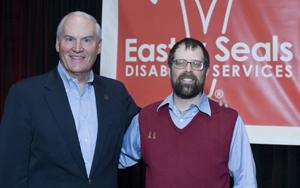Dr. Shore understands autism
by Patricia Wright
Last week, the Department of Health and Human Services (HHS) announced the appointees for a new Interagency Autism Coordinating Committee.Â
In a press release, HHS Secretary Mike Leavitt said:
“This important committee will play a key role in coordinating autism research, services, and education related to Autism Spectrum Disorder. I’m pleased that its members bring to the committee a wide range and great depth of expertise, including research and program administration, advocacy and personal experience with the condition.”
I was absolutely delighted to hear that Dr. Stephen Shore, a person with autism, has been tapped for membership. Shore is executive director of Autism Spectrum Disorder Consulting and serves on the board of the Autism Society of America (ASA). His books about autism are available at the Easter Seals and Autism bookstore, and you can read a review of his book, Beyond the Wall, on our blog.
 I had the pleasure of meeting Shore at our 2007 Easter Seals Training Conference in April. Shore is a well-known public speaker, and at the conference he provided a personal perspective on the experience of living with autism. His presentation was truly one of the highlights of the conference. There were over 400 people in attendance that day and they walked away with a much better understanding of autism.
I had the pleasure of meeting Shore at our 2007 Easter Seals Training Conference in April. Shore is a well-known public speaker, and at the conference he provided a personal perspective on the experience of living with autism. His presentation was truly one of the highlights of the conference. There were over 400 people in attendance that day and they walked away with a much better understanding of autism.
Individuals with autism have the greatest understanding of the nature of their disorder. Through advocacy efforts, people with autism can convey their unique needs to the community and support providers.
Shore’s appointment gives the Interagency Autism Coordinating Committee the “personal touch” it needs.Â







 This time of year, I find myself reflecting on what I am most thankful for. I have so many things in my life that have truly blessed me, but one of the most amazing blessings is having an autistic son.
This time of year, I find myself reflecting on what I am most thankful for. I have so many things in my life that have truly blessed me, but one of the most amazing blessings is having an autistic son.